Engerman S.L., Gallman R.E. The Cambridge Economic History of the United States, Vol. 1: The Colonial Era
Подождите немного. Документ загружается.

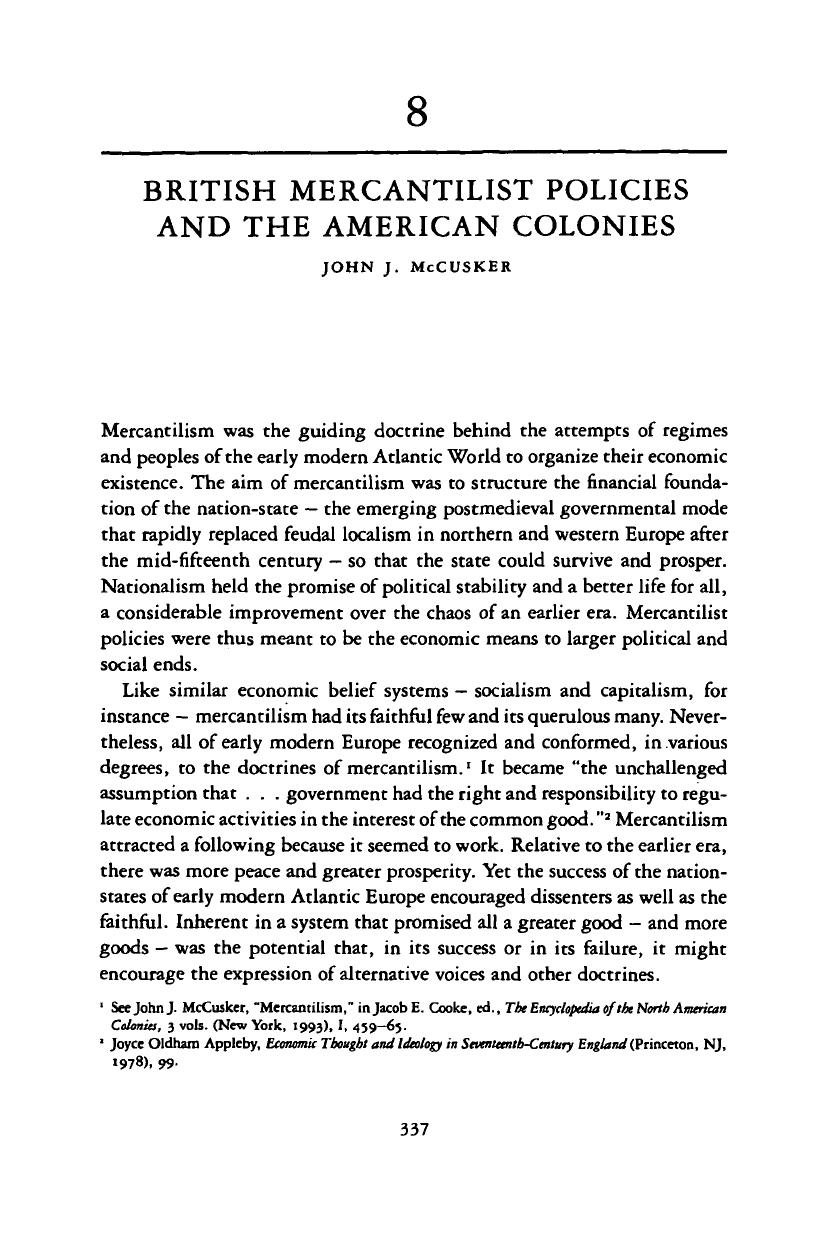
8
BRITISH MERCANTILIST POLICIES
AND THE AMERICAN COLONIES
JOHN J. McCUSKER
Mercantilism was the guiding doctrine behind the attempts of regimes
and peoples of the early modern Atlantic World to organize their economic
existence. The aim of mercantilism was to structure the financial founda-
tion of the nation-state
—
the emerging postmedieval governmental mode
that rapidly replaced feudal localism in northern and western Europe after
the mid-fifteenth century
—
so that the state could survive and prosper.
Nationalism held the promise of political stability and a better life for all,
a considerable improvement over the chaos of an earlier era. Mercantilist
policies were thus meant to be the economic means to larger political and
social ends.
Like similar economic belief systems - socialism and capitalism, for
instance - mercantilism had its faithful few and its querulous many. Never-
theless, all of early modern Europe recognized and conformed, in various
degrees, to the doctrines of mercantilism.
1
It became "the unchallenged
assumption that . . . government had the right and responsibility to regu-
late economic activities in the interest of the common good.
"
2
Mercantilism
attracted a following because it seemed to work. Relative to the earlier era,
there was more peace and greater prosperity. Yet the success of the nation-
states of early modern Atlantic Europe encouraged dissenters as well as the
faithful. Inherent in a system that promised all a greater good
—
and more
goods
—
was the potential that, in its success or in its failure, it might
encourage the expression of alternative voices and other doctrines.
1
See
John J. McCusker, "Mercantilism," in Jacob E. Cooke, ed., The
Encyclopedia
of
the North American
Colonies, 3 vols. (New York, 1993), I, 459—65.
2
Joyce Oldham Appleby,
Economic Thought
and
Ideology
in
Seventeenth-Century
England (Princeton, NJ,
1978),
99-
337
Cambridge Histories Online © Cambridge University Press, 2008
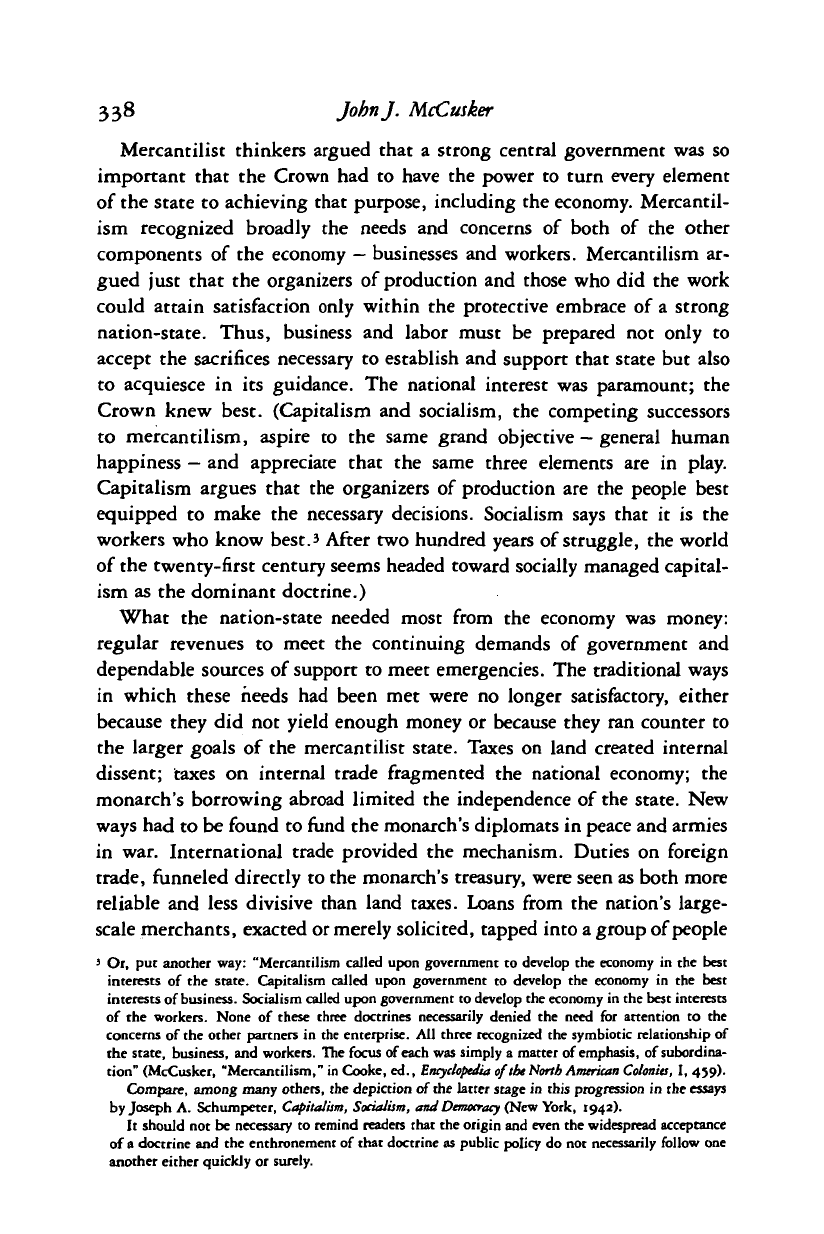
338
JohnJ.
McCusker
Mercantilist thinkers argued that a strong central government was so
important that the Crown had to have the power to turn every element
of the state to achieving that purpose, including the economy. Mercantil-
ism recognized broadly the needs and concerns of both of the other
components of the economy
—
businesses and workers. Mercantilism ar-
gued just that the organizers of production and those who did the work
could attain satisfaction only within the protective embrace of a strong
nation-state. Thus, business and labor must be prepared not only to
accept the sacrifices necessary to establish and support that state but also
to acquiesce in its guidance. The national interest was paramount; the
Crown knew best. (Capitalism and socialism, the competing successors
to mercantilism, aspire to the same grand objective - general human
happiness
—
and appreciate that the same three elements are in play.
Capitalism argues that the organizers of production are the people best
equipped to make the necessary decisions. Socialism says that it is the
workers who know best.' After two hundred years of struggle, the world
of the twenty-first century seems headed toward socially managed capital-
ism as the dominant doctrine.)
What the nation-state needed most from the economy was money:
regular revenues to meet the continuing demands of government and
dependable sources of support to meet emergencies. The traditional ways
in which these needs had been met were no longer satisfactory, either
because they did not yield enough money or because they ran counter to
the larger goals of the mercantilist state. Taxes on land created internal
dissent; taxes on internal trade fragmented the national economy; the
monarch's borrowing abroad limited the independence of the state. New
ways had to be found to fund the monarch's diplomats in peace and armies
in war. International trade provided the mechanism. Duties on foreign
trade, funneled directly to the monarch's treasury, were seen as both more
reliable and less divisive than land taxes. Loans from the nation's large-
scale merchants, exacted or merely solicited, tapped into a group of people
> Or, put another way: "Mercantilism called upon government to develop the economy in the best
interests of the state. Capitalism called upon government to develop the economy in the best
interests of business. Socialism called upon government to develop the economy in the best interests
of the workers. None of these three doctrines necessarily denied the need for attention to the
concerns of the other partners in the enterprise. AH three recognized the symbiotic relationship of
the state, business, and workers. The focus of each was simply a matter of emphasis, of subordina-
tion"
(McCusker, "Mercantilism," in Cooke, ed.,
Encyclopedia
of the North Amman
Colonies,
I, 459).
Compare, among many others, the depiction of the latter stage in this progression in the essays
by Joseph A. Schumpeter, Capitalism, Socialism, and
Democracy
(New York, 1942).
It should not be necessary to remind readers that the origin and even the widespread acceptance
of a doctrine and the enthronement of that doctrine as public policy do not necessarily follow one
another either quickly or surely.
Cambridge Histories Online © Cambridge University Press, 2008
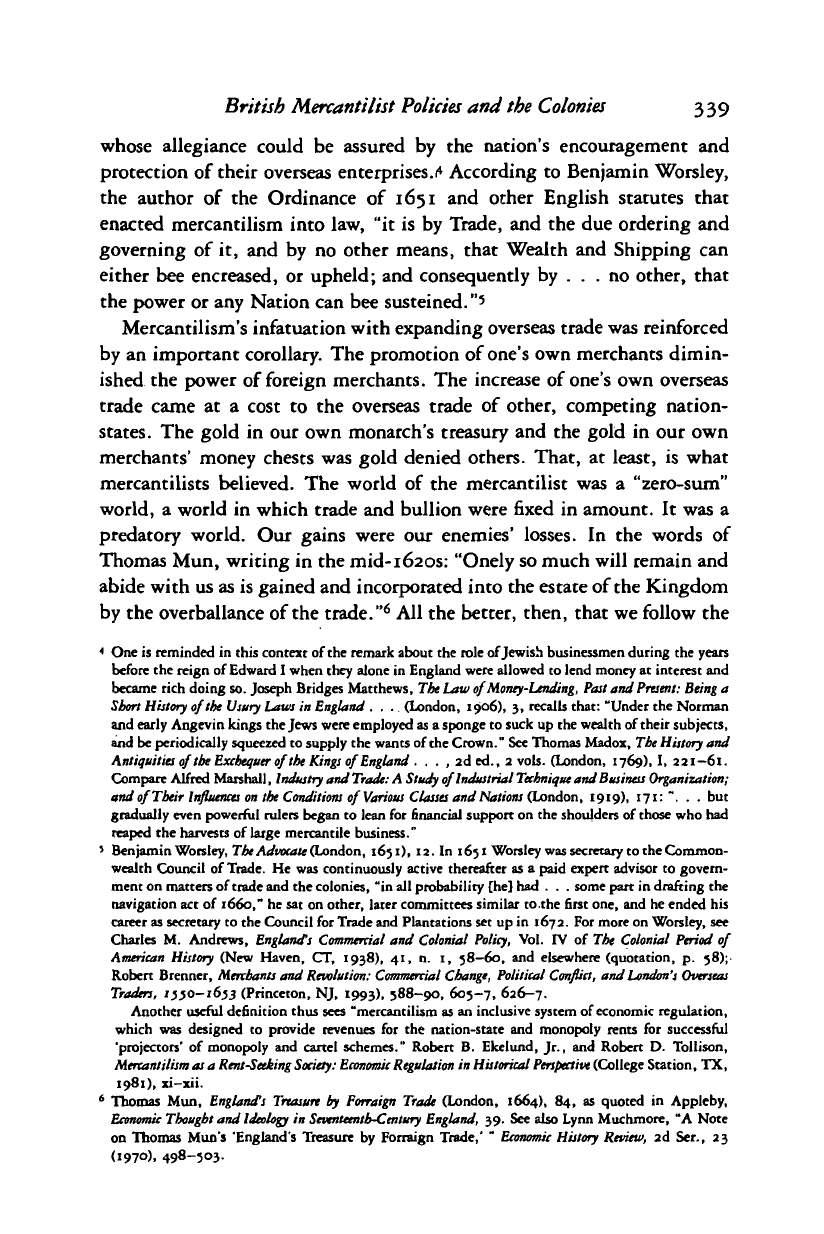
British Mercantilist
Policies
and the Colonies 339
whose allegiance could be assured by the nation's encouragement and
protection of their overseas enterprises.
1*
According to Benjamin Worsley,
the author of the Ordinance of 1651 and other English statutes that
enacted mercantilism into law, "it is by Trade, and the due ordering and
governing of it, and by no other means, that Wealth and Shipping can
either bee encreased, or upheld; and consequently by ... no other, that
the power or any Nation can bee susteined."
5
Mercantilism's infatuation with expanding overseas trade was reinforced
by an important corollary. The promotion of one's own merchants dimin-
ished the power of foreign merchants. The increase of one's own overseas
trade came at a cost to the overseas trade of other, competing nation-
states.
The gold in our own monarch's treasury and the gold in our own
merchants' money chests was gold denied others. That, at least, is what
mercantilists believed. The world of the mercantilist was a "zero-sum"
world, a world in which trade and bullion were fixed in amount. It was a
predatory world. Our gains were our enemies' losses. In the words of
Thomas Mun, writing in the mid-i62os: "Onely so much will remain and
abide with us as is gained and incorporated into the estate of the Kingdom
by the overballance of the trade."
6
All the better, then, that we follow the
4
One is reminded in this context of the remark about the role of Jewish businessmen during the years
before the reign of Edward I when they alone in England were allowed to lend money at interest and
became rich doing so. Joseph Bridges Matthews,
The
Law of Money-Lending,
Past
andPraent:
Being
a
Short History of the Usury Laws in England ... (London, 1906), 3, recalls that: "Under the Norman
and early Angevin kings the Jews were employed as a sponge to suck up the wealth of their subjects,
and be periodically squeezed to supply the wants of the Crown." See Thomas Madox, The History and
Antiquities of the
Exchequer
of the Kings of England . . . , 2d ed., 2 vols. (London, 1769), I, 221—61.
Compare Alfred Marshall, Industry and
Trade:
A Study of Industrial
Technique
and
Business
Organization;
and of Their
Influences on
the
Conditions
of
Various Classes
and
Nations
(London, 1919),
171:".
. . but
gradually even powerful rulers began to lean for financial support on the shoulders of those who had
reaped the harvests of large mercantile business."
' Benjamin Worsley,
The Advocate
(London, 1651), 12. In 1651 Worsley was secretary to the Common-
wealth Council of Trade. He was continuously active thereafter as a paid expert advisor to govern-
ment on matters of trade and the colonies, "in all probability [he] had . . . some part in drafting the
navigation act of 1660," he sat on other, later committees similar to the first one, and he ended his
career as secretary to the Council for Trade and Plantations set up in 1672. For more on Worsley, see
Charles M. Andrews, England's
Commercial
and Colonial Policy, Vol. IV of The Colonial Period of
American History (New Haven, CT, 1938), 41, n. 1, 58-60, and elsewhere (quotation, p. 58);
Robert Brenner,
Merchants
and
Revolution:
Commercial
Change,
Political
Conflict,
and
London's Overseas
Traders,
IJJO—I6}3
(Princeton, NJ, 1993), 588—90, 605—7, 626—7.
Another useful definition thus sees "mercantilism as an inclusive system of economic regulation,
which was designed to provide revenues for the nation-state and monopoly rents for successful
'projectors' of monopoly and cartel schemes." Robert B. Ekelund, Jr., and Robert D. Tollison,
Mercantilism
as a
Rent-Seeking
Society:
Economic Regulation
in Historical
Perspective
(College Station, TX,
1981),
xi-xii.
6
Thomas Mun, England's
Treasure
by Forraign Trade (London, 1664), 84, as quoted in Appleby,
Economic Thought
and
Ideology
in
Seventeenth-Century
England, 39. See also Lynn Muchmore, "A Note
on Thomas Mun's 'England's Treasure by Forraign Trade,' "
Economic
History Review, 2d Ser., 23
(I97O), 498-503-
Cambridge Histories Online © Cambridge University Press, 2008
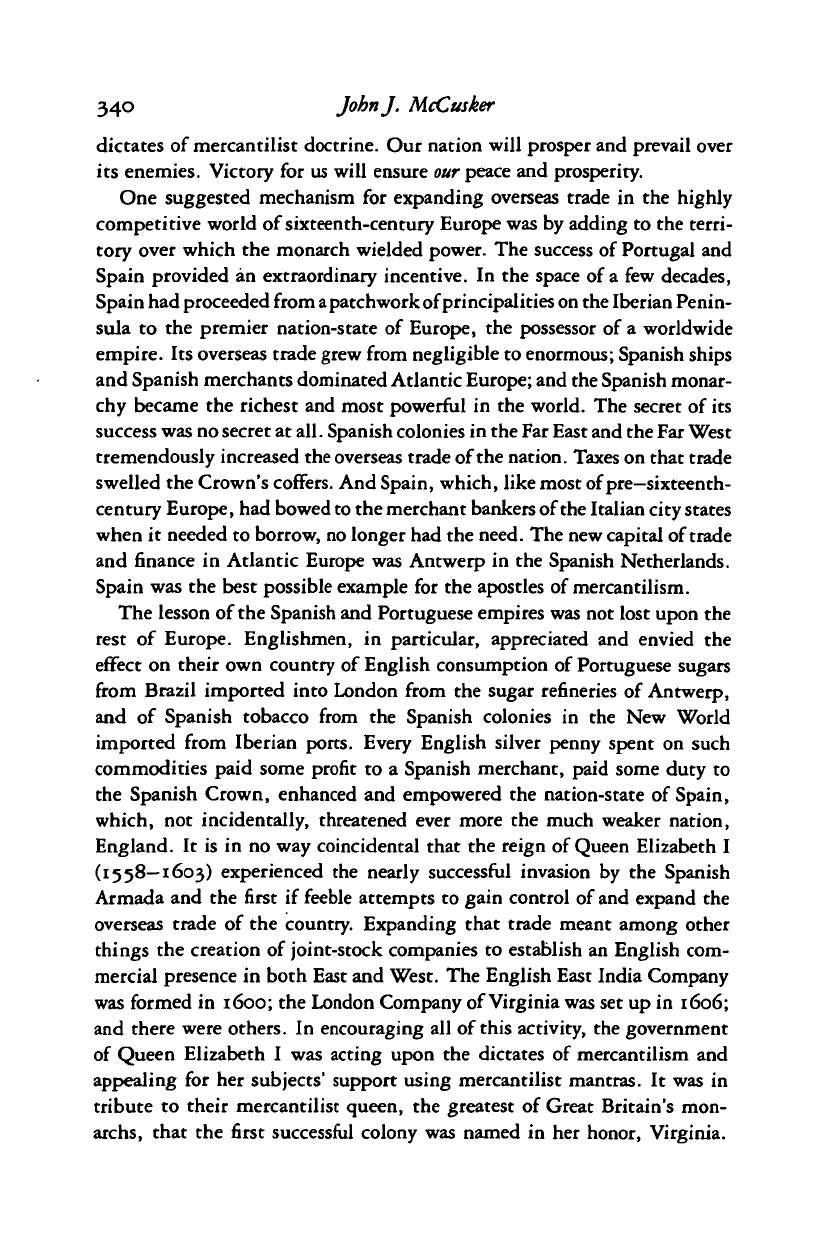
340
JohnJ.
McCusker
dictates of mercantilist doctrine. Our nation will prosper and prevail over
its enemies. Victory for us will ensure
our
peace and prosperity.
One suggested mechanism for expanding overseas trade in the highly
competitive world of sixteenth-century Europe was by adding to the terri-
tory over which the monarch wielded power. The success of Portugal and
Spain provided an extraordinary incentive. In the space of
a
few decades,
Spain had proceeded from a patchwork of principalities
on the
Iberian Penin-
sula to the premier nation-state of Europe, the possessor of a worldwide
empire. Its overseas trade grew from negligible to enormous; Spanish ships
and Spanish merchants dominated Atlantic
Europe;
and the Spanish monar-
chy became the richest and most powerful in the world. The secret of its
success
was no
secret at
all.
Spanish colonies in the Far East and the Far West
tremendously increased the
overseas
trade of the nation. Taxes on that trade
swelled the Crown's coffers. And
Spain,
which, like most of pre—sixteenth-
century Europe, had bowed to the merchant bankers of the Italian city states
when it needed to borrow, no longer had the need. The new capital of trade
and finance in Atlantic Europe was Antwerp in the Spanish Netherlands.
Spain was the best possible example for the apostles of mercantilism.
The lesson of the Spanish and Portuguese empires was not lost upon the
rest of Europe. Englishmen, in particular, appreciated and envied the
effect on their own country of English consumption of Portuguese sugars
from Brazil imported into London from the sugar refineries of Antwerp,
and of Spanish tobacco from the Spanish colonies in the New World
imported from Iberian ports. Every English silver penny spent on such
commodities paid some profit to a Spanish merchant, paid some duty to
the Spanish Crown, enhanced and empowered the nation-state of Spain,
which, not incidentally, threatened ever more the much weaker nation,
England. It is in no way coincidental that the reign of Queen Elizabeth I
(1558—1603) experienced the nearly successful invasion by the Spanish
Armada and the first if feeble attempts to gain control of and expand the
overseas trade of the country. Expanding that trade meant among other
things the creation of joint-stock companies to establish an English com-
mercial presence in both East and West. The English East India Company
was formed in 1600; the London Company of Virginia
was
set up in 1606;
and there were others. In encouraging all of this activity, the government
of Queen Elizabeth I was acting upon the dictates of mercantilism and
appealing for her subjects' support using mercantilist mantras. It was in
tribute to their mercantilist queen, the greatest of Great Britain's mon-
archs,
that the first successful colony was named in her honor, Virginia.
Cambridge Histories Online © Cambridge University Press, 2008
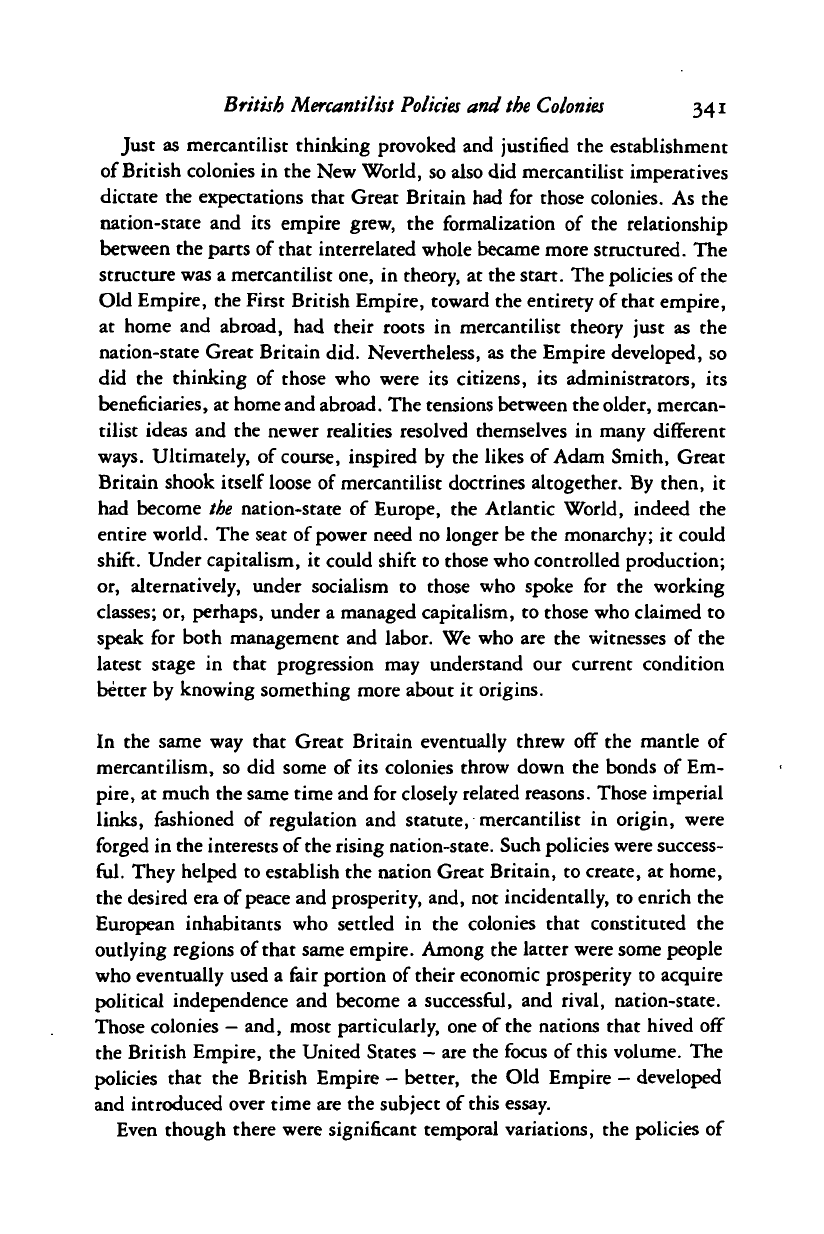
British Mercantilist
Policies
and
the Colonies
341
Just as mercantilist thinking provoked and justified the establishment
of British colonies in the New World, so also did mercantilist imperatives
dictate the expectations that Great Britain had for those colonies. As the
nation-state and its empire grew, the formalization of the relationship
between the parts of that interrelated whole became more structured. The
structure was a mercantilist one, in theory, at the start. The policies of the
Old Empire, the First British Empire, toward the entirety of that empire,
at home and abroad, had their roots in mercantilist theory just as the
nation-state Great Britain did. Nevertheless, as the Empire developed, so
did the thinking of those who were its citizens, its administrators, its
beneficiaries, at home and abroad. The tensions between the older, mercan-
tilist ideas and the newer realities resolved themselves in many different
ways.
Ultimately, of
course,
inspired by the likes of Adam Smith, Great
Britain shook itself
loose
of mercantilist doctrines altogether. By then, it
had become the nation-state of Europe, the Atlantic World, indeed the
entire world. The seat of power need no longer be the monarchy; it could
shift. Under capitalism, it could shift to those who controlled production;
or, alternatively, under socialism to those who spoke for the working
classes; or, perhaps, under a managed capitalism, to those who claimed to
speak for both management and labor. We who are the witnesses of the
latest stage in that progression may understand our current condition
better by knowing something more about it origins.
In the same way that Great Britain eventually threw off the mantle of
mercantilism, so did some of its colonies throw down the bonds of Em-
pire,
at much the same time and for closely related reasons. Those imperial
links,
fashioned of regulation and statute, mercantilist in origin, were
forged in the interests of the rising nation-state. Such policies were success-
ful.
They helped to establish the nation Great Britain, to create, at home,
the desired era of peace and prosperity, and, not incidentally, to enrich the
European inhabitants who settled in the colonies that constituted the
outlying regions of that same empire. Among the latter were some people
who eventually used a fair portion of their economic prosperity to acquire
political independence and become a successful, and rival, nation-state.
Those colonies - and, most particularly, one of the nations that hived off
the British Empire, the United States - are the focus of
this
volume. The
policies that the British Empire
—
better, the Old Empire
—
developed
and introduced over time are the subject of this essay.
Even though there were significant temporal variations, the policies of
Cambridge Histories Online © Cambridge University Press, 2008
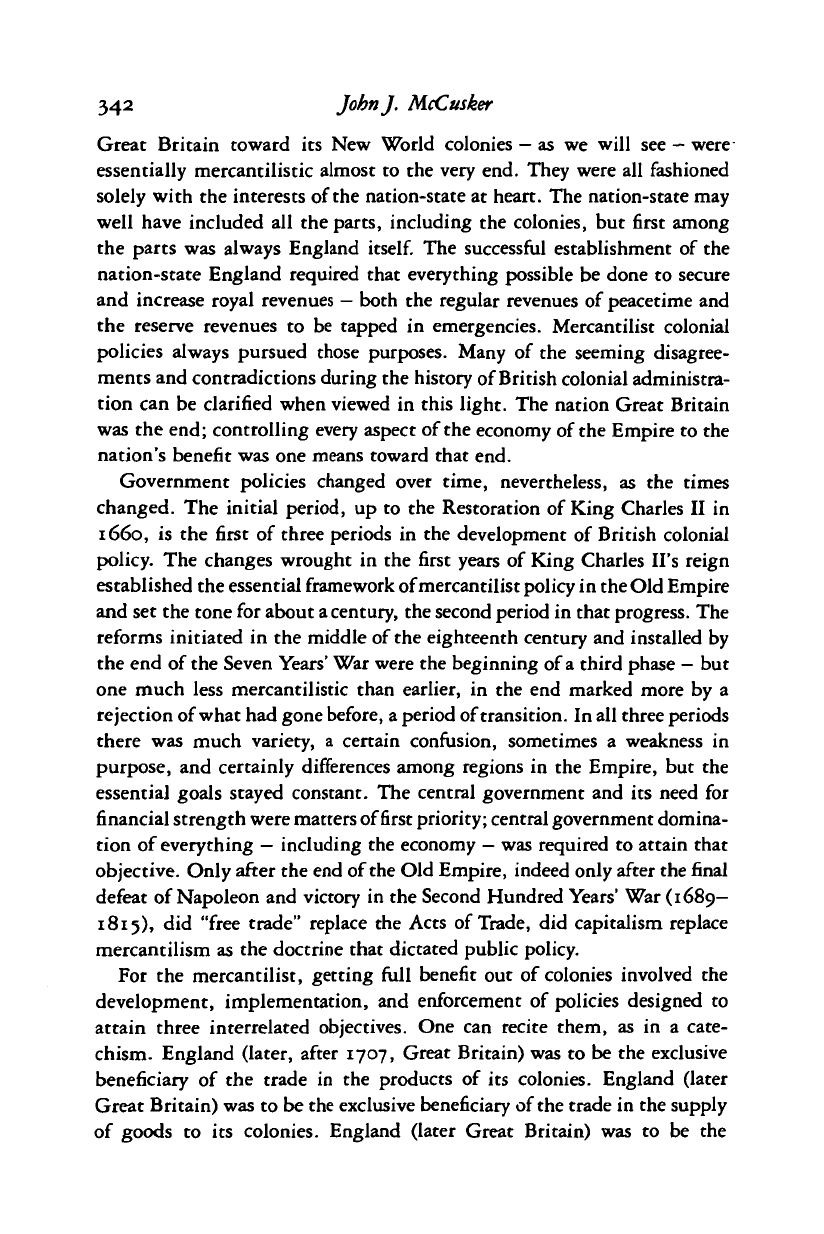
342 John]. McCusker
Great Britain toward its New World colonies
—
as we will see
—
were
essentially mercantilistic almost to the very end. They were all fashioned
solely with the interests of the nation-state at heart. The nation-state may
well have included all the parts, including the colonies, but first among
the parts was always England
itself.
The successful establishment of the
nation-state England required that everything possible be done to secure
and increase royal revenues
—
both the regular revenues of peacetime and
the reserve revenues to be tapped in emergencies. Mercantilist colonial
policies always pursued those purposes. Many of the seeming disagree-
ments and contradictions during the history of British colonial administra-
tion can be clarified when viewed in this light. The nation Great Britain
was the end; controlling every aspect of
the
economy of the Empire to the
nation's benefit was one means toward that end.
Government policies changed over time, nevertheless, as the times
changed. The initial period, up to the Restoration of King Charles II in
1660,
is the first of three periods in the development of British colonial
policy. The changes wrought in the first years of King Charles H's reign
established the essential framework of mercantilist policy in
the
Old Empire
and set the tone for about
a
century,
the second period in that
progress.
The
reforms initiated in the middle of the eighteenth century and installed by
the end of the Seven Years' War were the beginning of a third phase - but
one much less mercantilistic than earlier, in the end marked more by a
rejection of what had gone before,
a
period of transition. In all three periods
there was much variety, a certain confusion, sometimes a weakness in
purpose, and certainly differences among regions in the Empire, but the
essential goals stayed constant. The central government and its need for
financial strength were matters of
first
priority; central government domina-
tion of everything
—
including the economy
—
was required to attain that
objective. Only after the end of the Old Empire, indeed only after the final
defeat of Napoleon and victory in the Second Hundred Years' War (1689-
1815),
did "free trade" replace the Acts of Trade, did capitalism replace
mercantilism as the doctrine that dictated public policy.
For the mercantilist, getting full benefit out of colonies involved the
development, implementation, and enforcement of policies designed to
attain three interrelated objectives. One can recite them, as in a cate-
chism. England (later, after 1707, Great Britain) was to be the exclusive
beneficiary of the trade in the products of its colonies. England (later
Great Britain) was to be the exclusive beneficiary of the trade in the supply
of goods to its colonies. England (later Great Britain) was to be the
Cambridge Histories Online © Cambridge University Press, 2008
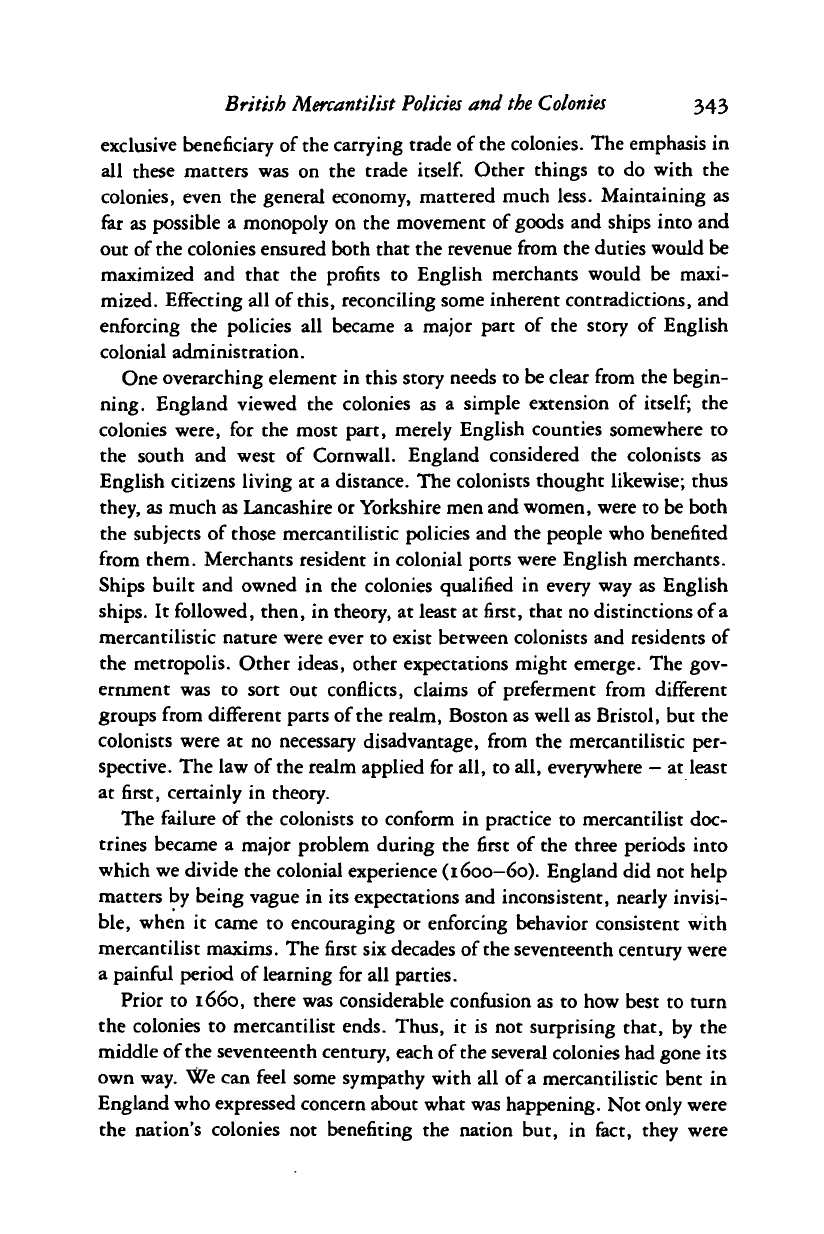
British Mercantilist
Policies
and
the Colonies
343
exclusive beneficiary
of
the
carrying trade
of
the
colonies. The emphasis
in
all these matters
was on the
trade
itself.
Other things
to do
with
the
colonies, even
the
general economy, mattered much less. Maintaining
as
far
as
possible
a
monopoly
on the
movement
of
goods
and
ships into
and
out
of
the
colonies ensured both that
the
revenue from the duties would
be
maximized
and
that
the
profits
to
English merchants would
be
maxi-
mized. Effecting
all of
this,
reconciling some inherent contradictions,
and
enforcing
the
policies
all
became
a
major part
of the
story
of
English
colonial administration.
One overarching element
in
this story needs
to be
clear from
the
begin-
ning. England viewed
the
colonies
as a
simple extension
of itself; the
colonies were,
for the
most part, merely English counties somewhere
to
the south
and
west
of
Cornwall. England considered
the
colonists
as
English citizens living
at a
distance.
The
colonists thought likewise; thus
they,
as
much as Lancashire
or
Yorkshire men
and
women, were
to be
both
the subjects
of
those mercantilistic policies
and the
people
who
benefited
from them. Merchants resident
in
colonial ports were English merchants.
Ships built
and
owned
in the
colonies qualified
in
every
way as
English
ships.
It
followed, then,
in
theory,
at
least
at
first, that no distinctions of a
mercantilistic nature were ever
to
exist between colonists
and
residents
of
the metropolis. Other ideas, other expectations might emerge.
The gov-
ernment
was to
sort
out
conflicts, claims
of
preferment from different
groups from different parts of the realm, Boston as well as Bristol,
but the
colonists were
at no
necessary disadvantage, from
the
mercantilistic
per-
spective.
The law of
the realm applied
for
all,
to
all, everywhere
- at
least
at first, certainly
in
theory.
The failure
of the
colonists
to
conform
in
practice
to
mercantilist
doc-
trines became
a
major problem during
the
first
of the
three periods into
which
we
divide
the
colonial experience (1600-60). England
did not
help
matters
by
being vague
in its
expectations
and
inconsistent, nearly invisi-
ble,
when
it
came
to
encouraging
or
enforcing behavior consistent with
mercantilist maxims.
The
first
six decades
of
the
seventeenth century were
a painful period
of
learning
for all
parties.
Prior
to 1660,
there
was
considerable confusion
as to how
best
to
turn
the colonies
to
mercantilist ends. Thus,
it is not
surprising that,
by the
middle of the seventeenth century, each of the several colonies had gone
its
own way.
We can
feel some sympathy with
all of
a
mercantilistic bent
in
England who expressed concern about what was happening.
Not
only were
the nation's colonies
not
benefiting
the
nation
but, in
fact, they were
Cambridge Histories Online © Cambridge University Press, 2008
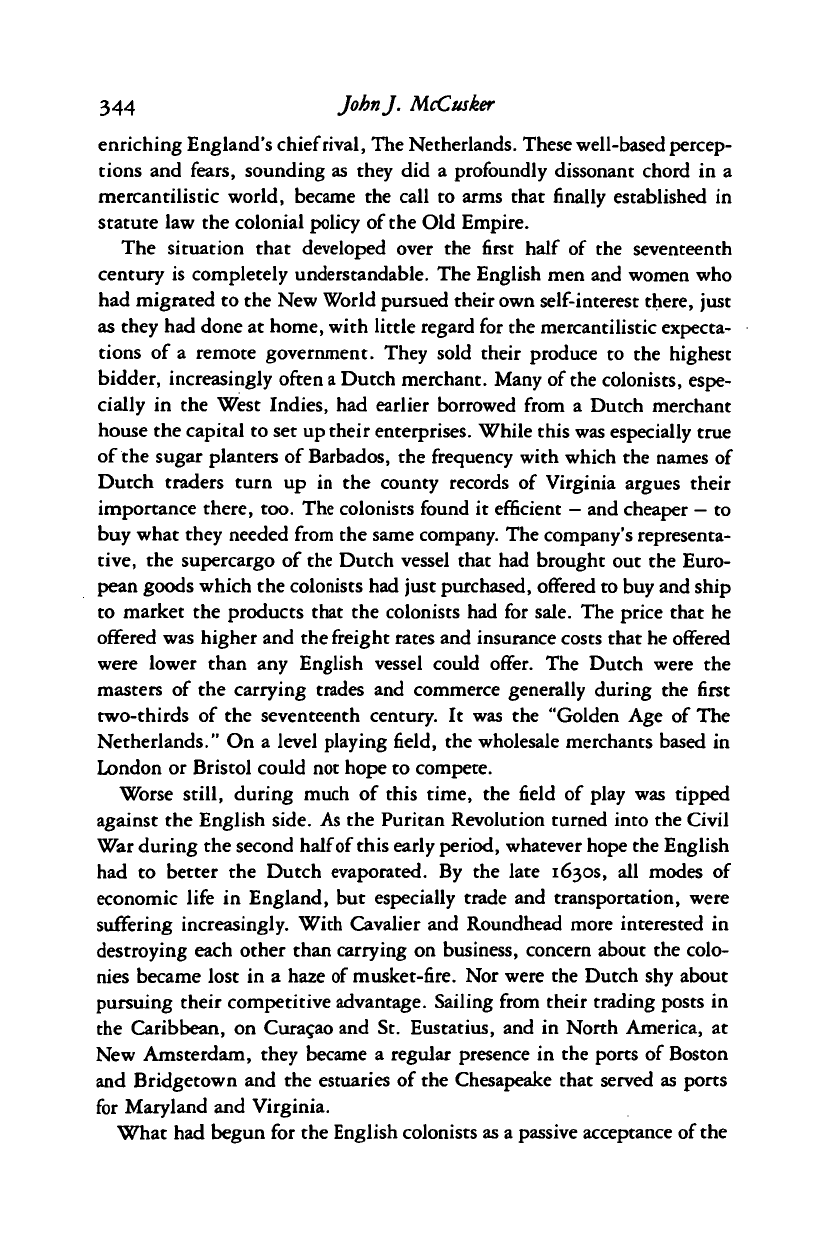
344
JohnJ.
McCusker
enriching England's chief rival, The Netherlands. These well-based percep-
tions and fears, sounding as they did a profoundly dissonant chord in a
mercantilistic world, became the call to arms that finally established in
statute law the colonial policy of the Old Empire.
The situation that developed over the first half of the seventeenth
century is completely understandable. The English men and women who
had migrated to the New World pursued their own self-interest there, just
as they had done at home, with little regard for the mercantilistic expecta-
tions of a remote government. They sold their produce to the highest
bidder, increasingly often
a
Dutch merchant. Many of the colonists, espe-
cially in the West Indies, had earlier borrowed from a Dutch merchant
house the capital to set up their enterprises. While this was especially true
of the sugar planters of Barbados, the frequency with which the names of
Dutch traders turn up in the county records of Virginia argues their
importance there, too. The colonists found it efficient
—
and cheaper
—
to
buy what they needed from the same company. The company's representa-
tive,
the supercargo of the Dutch vessel that had brought out the Euro-
pean goods which the colonists had just purchased, offered to buy and ship
to market the products that the colonists had for sale. The price that he
offered was higher and the freight rates and insurance costs that he offered
were lower than any English vessel could offer. The Dutch were the
masters of the carrying trades and commerce generally during the first
two-thirds of the seventeenth century. It was the "Golden Age of The
Netherlands." On a level playing field, the wholesale merchants based in
London or Bristol could not hope to compete.
Worse still, during much of this time, the field of play was tipped
against the English side. As the Puritan Revolution turned into the Civil
War during the second half of
this
early period, whatever hope the English
had to better the Dutch evaporated. By the late 1630s, all modes of
economic life in England, but especially trade and transportation, were
suffering increasingly. With Cavalier and Roundhead more interested in
destroying each other than carrying on business, concern about the colo-
nies became lost in a haze of musket-fire. Nor were the Dutch shy about
pursuing their competitive advantage. Sailing from their trading posts in
the Caribbean, on Curacao and St. Eustatius, and in North America, at
New Amsterdam, they became a regular presence in the ports of Boston
and Bridgetown and the estuaries of the Chesapeake that served as ports
for Maryland and Virginia.
What had begun for the English colonists as a passive acceptance of the
Cambridge Histories Online © Cambridge University Press, 2008
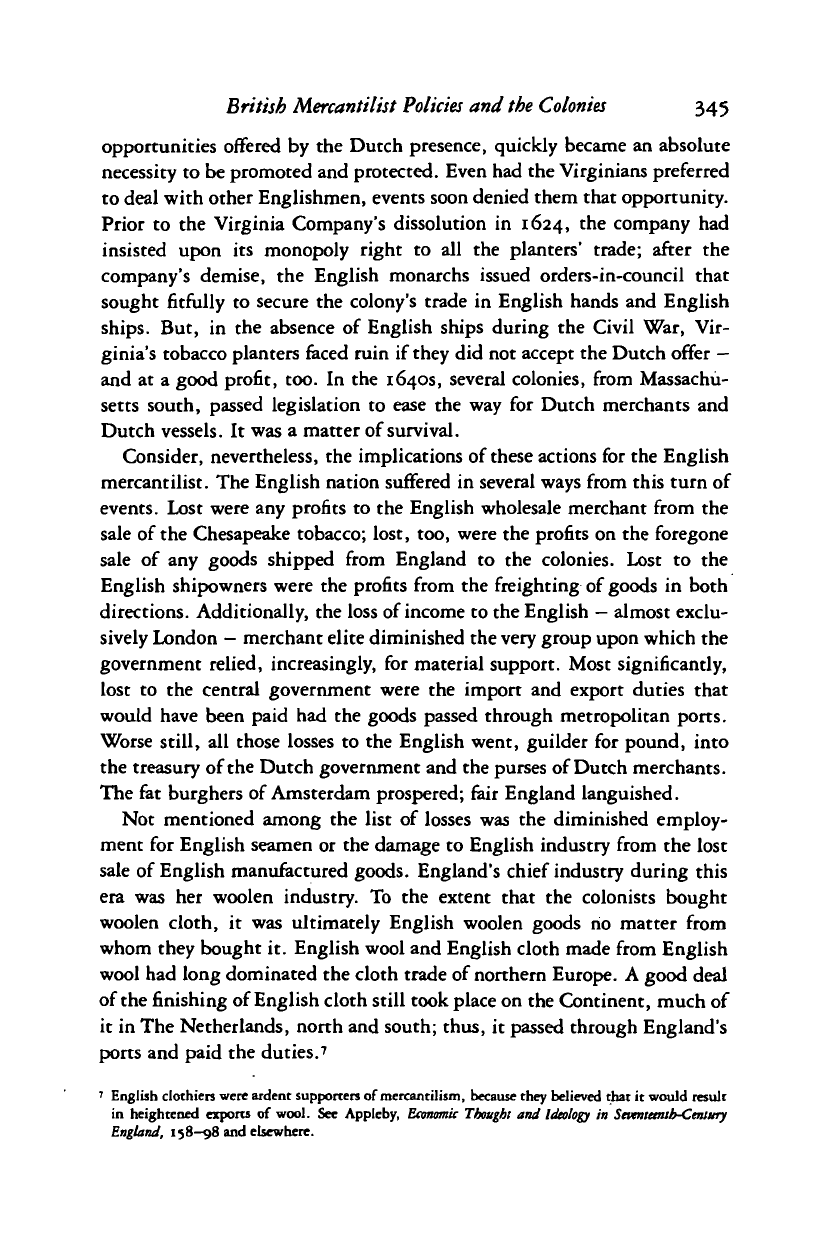
British
Mercantilist Policies
and
the Colonies
345
opportunities offered by the Dutch presence, quickly became an absolute
necessity to be promoted and protected. Even had the Virginians preferred
to deal with other Englishmen, events soon denied them that opportunity.
Prior to the Virginia Company's dissolution in 1624, the company had
insisted upon its monopoly right to all the planters' trade; after the
company's demise, the English monarchs issued orders-in-council that
sought fitfully to secure the colony's trade in English hands and English
ships.
But, in the absence of English ships during the Civil War, Vir-
ginia's tobacco planters faced ruin if they did not accept the Dutch offer
—
and at a good profit, too. In the 1640s, several colonies, from Massachu-
setts south, passed legislation to ease the way for Dutch merchants and
Dutch vessels. It was a matter of survival.
Consider, nevertheless, the implications of
these
actions for the English
mercantilist. The English nation suffered in several ways from this turn of
events. Lost were any profits to the English wholesale merchant from the
sale of the Chesapeake tobacco; lost, too, were the profits on the foregone
sale of any goods shipped from England to the colonies. Lost to the
English shipowners were the profits from the freighting of
goods
in both
directions. Additionally, the loss of income to the English
—
almost exclu-
sively London - merchant elite diminished the very group upon which the
government relied, increasingly, for material support. Most significantly,
lost to the central government were the import and export duties that
would have been paid had the goods passed through metropolitan ports.
Worse still, all those losses to the English went, guilder for pound, into
the treasury of the Dutch government and the purses of Dutch merchants.
The fat burghers of Amsterdam prospered; fair England languished.
Not mentioned among the list of losses was the diminished employ-
ment for English seamen or the damage to English industry from the lost
sale of English manufactured goods. England's chief industry during this
era was her woolen industry. To the extent that the colonists bought
woolen cloth, it was ultimately English woolen goods no matter from
whom they bought it. English wool and English cloth made from English
wool had long dominated the cloth trade of northern Europe. A good deal
of
the
finishing of English cloth still took place on the Continent, much of
it in The Netherlands, north and south; thus, it passed through England's
ports and paid the duties.'
7
English clothiers were ardent supporters of mercantilism, because they believed that it would result
in heightened exports of wool. See Appleby,
Economic
Thought and
Ideology
in Samtemtb-Century
England, 158-98 and elsewhere.
Cambridge Histories Online © Cambridge University Press, 2008
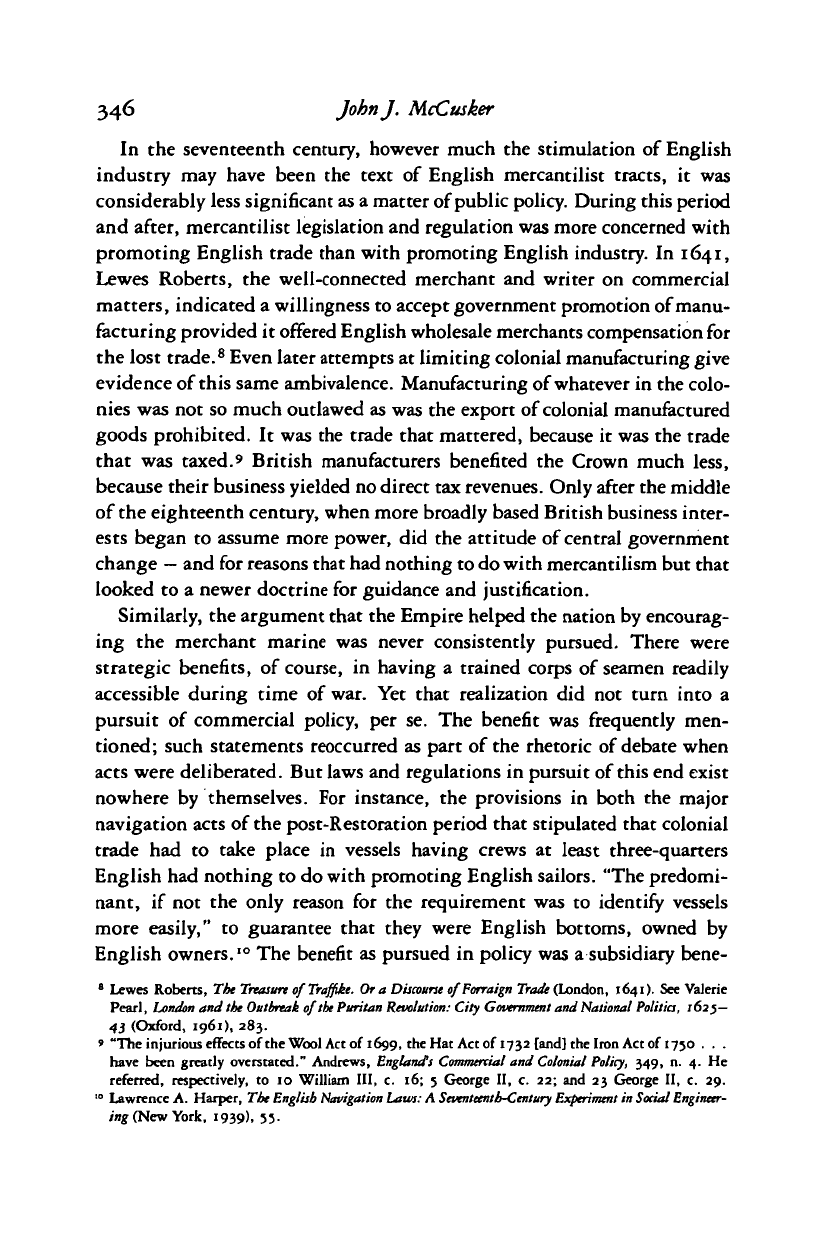
346
JohnJ.
McCusker
In the seventeenth century, however much the stimulation of English
industry may have been the text of English mercantilist tracts, it was
considerably less significant
as
a matter of public
policy.
During
this
period
and after, mercantilist legislation and regulation was more concerned with
promoting English trade than with promoting English industry. In 1641,
Lewes Roberts, the well-connected merchant and writer on commercial
matters, indicated a willingness to accept government promotion of manu-
facturing provided it offered English wholesale merchants compensation for
the lost trade.
8
Even later attempts at limiting colonial manufacturing give
evidence of this same ambivalence. Manufacturing of whatever in the colo-
nies was not so much outlawed as was the export of colonial manufactured
goods prohibited. It was the trade that mattered, because it was the trade
that was taxed.
9
British manufacturers benefited the Crown much less,
because their business yielded
no
direct tax
revenues.
Only after the middle
of the eighteenth century, when more broadly based British business inter-
ests began to assume more power, did the attitude of central government
change
—
and for reasons that had nothing to
do
with mercantilism but that
looked to a newer doctrine for guidance and justification.
Similarly, the argument that the Empire helped the nation by encourag-
ing the merchant marine was never consistently pursued. There were
strategic benefits, of course, in having a trained corps of seamen readily
accessible during time of war. Yet that realization did not turn into a
pursuit of commercial policy, per se. The benefit was frequently men-
tioned; such statements reoccurred as part of the rhetoric of debate when
acts were deliberated. But laws and regulations in pursuit of
this
end exist
nowhere by themselves. For instance, the provisions in both the major
navigation acts of the post-Restoration period that stipulated that colonial
trade had to take place in vessels having crews at least three-quarters
English had nothing to do with promoting English sailors. "The predomi-
nant, if not the only reason for the requirement was to identify vessels
more easily," to guarantee that they were English bottoms, owned by
English owners.
10
The benefit as pursued in policy was a subsidiary bene-
8
Lewes Roberts, The
Treasure
ofTraffite. Or a
Discourse
o/Forraign
Trade
(London, 1641). See Valerie
Pearl,
London
and
the
Outbreak of
the
Puritan
Revolution:
City
Government
and National
Politics,
1625—
43 (Oxford, 1961), 283.
» "The injurious effects of the Wool Act of 1699, the Hat Act of 1732 [and] the Iron Act of 1750 . . .
have been greatly overstated." Andrews, England's
Commercial
and Colonial
Policy,
349, n. 4. He
referred, respectively, to 10 William III, c. 16; 5 George II, c. 22; and 23 George II, c. 29.
10
Lawrence A. Harper, The English Navigation Laws: A
Seventeenth-Century Experiment
in
Social
Engineer-
ing (New York, 1939), 55.
Cambridge Histories Online © Cambridge University Press, 2008
